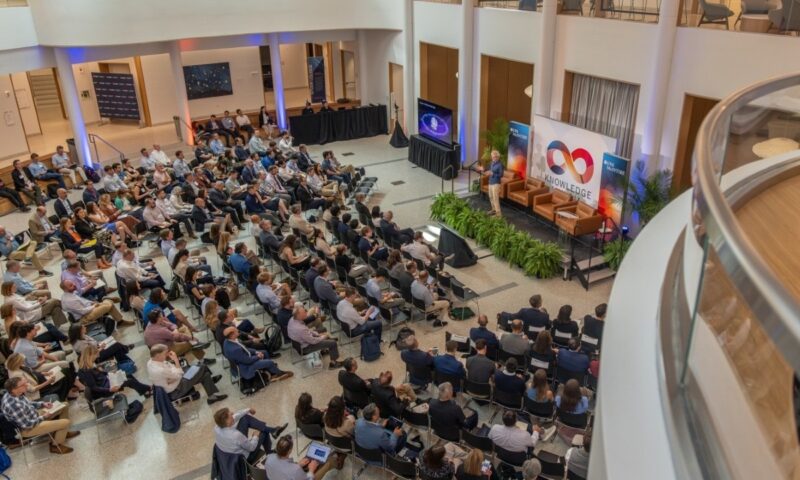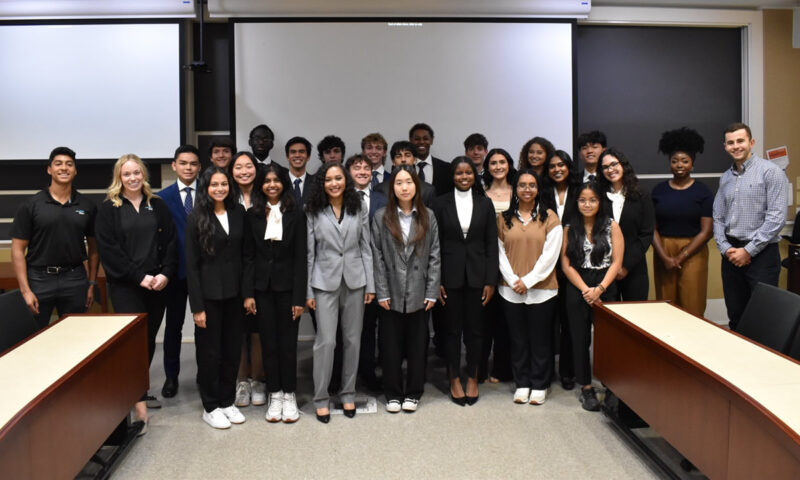Dr. Tiffany Jana, Founder of TMI Consulting Inc., brought an irrepressible enthusiasm to Rouss & Robertson Halls last month, speaking at three sessions of Professor Jeffrey Leopold’s “Foundations of Commerce” class about benefit corporations (B corporations) and their potential for advancing diversity, equity, and inclusion (“DEI”) efforts.
A highly sought-after speaker and co-author of titles such as The B Corp Handbook: How You Can Use Business as a Force for Good and Erasing Institutional Bias, Jana is known for helping to establish TMI’s national consultant network as the world’s first certified B corporation focused on diversity and engagement. An expert voice in strategic inclusion efforts, Jana explained to students why the B Corp movement and DEI initiatives matter, leaving ample time for many questions from the engaged room of student audience members.
The How and Why of B Corps
Certified with standards set by B Lab, a global nonprofit organization requiring companies to account for social sustainability, transparency, accountability standards, and environmental performance, B Corps now include nearly 3,000 companies that use business to create positive impact for the people who work for them, communities, and the environment. The relatively new economic segment began in 2007.
“The B Corp sector is an important part of the new inclusive and sustainable economy,” Jana explained. “Social enterprise provides a viable path to course correcting some of the systemic imbalances that plague society and the planet. The social enterprise sector is expanding who the stakeholders and shareholders are. We’re looking at a triple bottom line economy where we are profitable, but we’re also expanding who we maximize profit for to include our communities, our workers—how we structure and run our business—and we’re thinking about the long-term impact on the planet.”
Student Inquiries
After Jana explained their own personal work history involving the move from nonprofit work to the B Corp world, the floor was opened for questions. Students were interested to discover what the transition was like in moving from the strictly mission-driven construct of the nonprofit to the expanded B Corp life, to which Jana revealed that the quicker pace of a for-profit venture suited their personality much better.
Other students were curious about the various details surrounding B Corps: Do governments incentivize the creation of B Corps? (They don’t.) What does the nonprofit governing body B Lab do with the money they get from businesses? (They pay their expenses.) Since people disagree about what is considered “doing good,” how are B Corps measured for their impact, and how is that information distributed? (The B Impact Assessment provides scores to each company based on multiple factors, and those numbers are included in annual reports as well as online, where those scores are shared in a searchable database at bcorporation.net.)
Change Challenges
Jana noted that some of the greatest challenges that B Corps face in their drive to advance DEI efforts originate from the size of the organizations and their ability to properly allocate and attend to the often stringent demands of maintaining their certification.
“The vast majority of B Corps—like the vast majority of businesses in general—are small businesses. This means that prioritizing DEI presents substantial financial, time, and resource pressure to systems already working hard to survive.”
The most important takeaway about social entrepreneurship that Jana hoped to leave the students in attendance was to have an awareness and willingness to envision a different way to approach many of the world’s greatest issues.
“I hope they see an alternative path that should become the preferred path to sustainably support economic, social, and environmental interests.”



